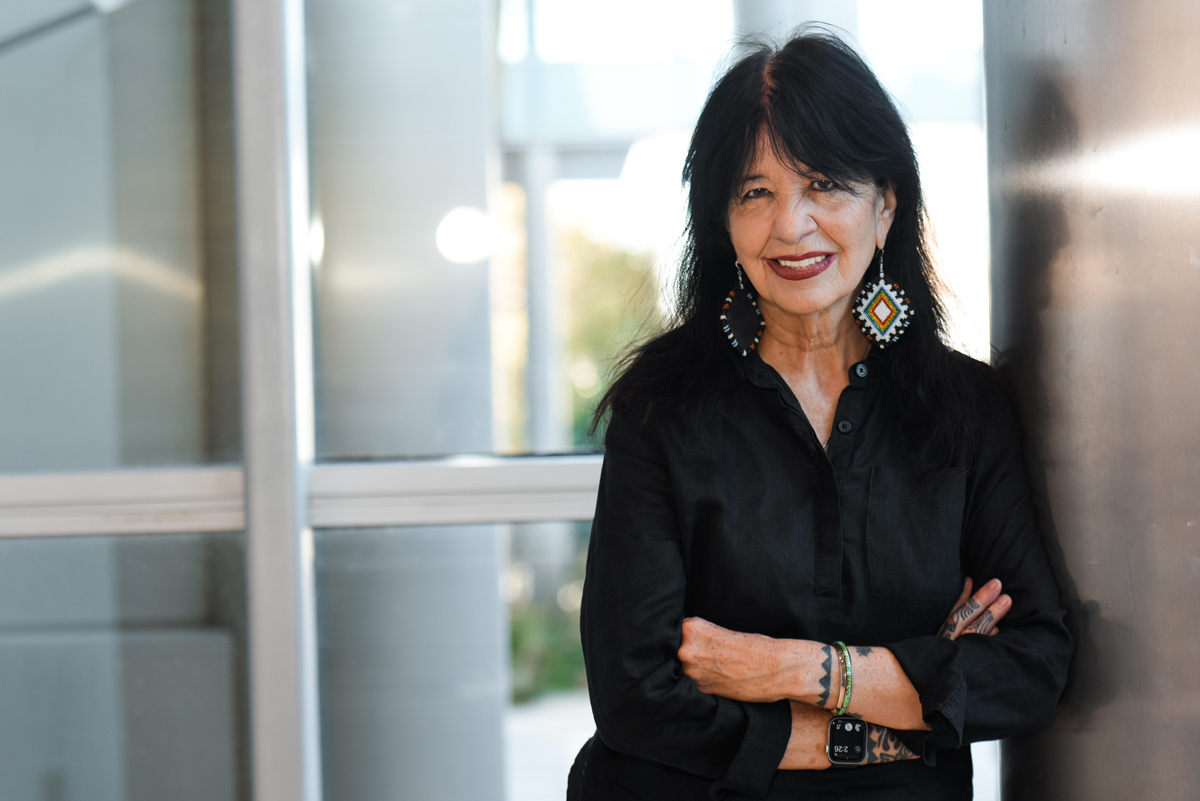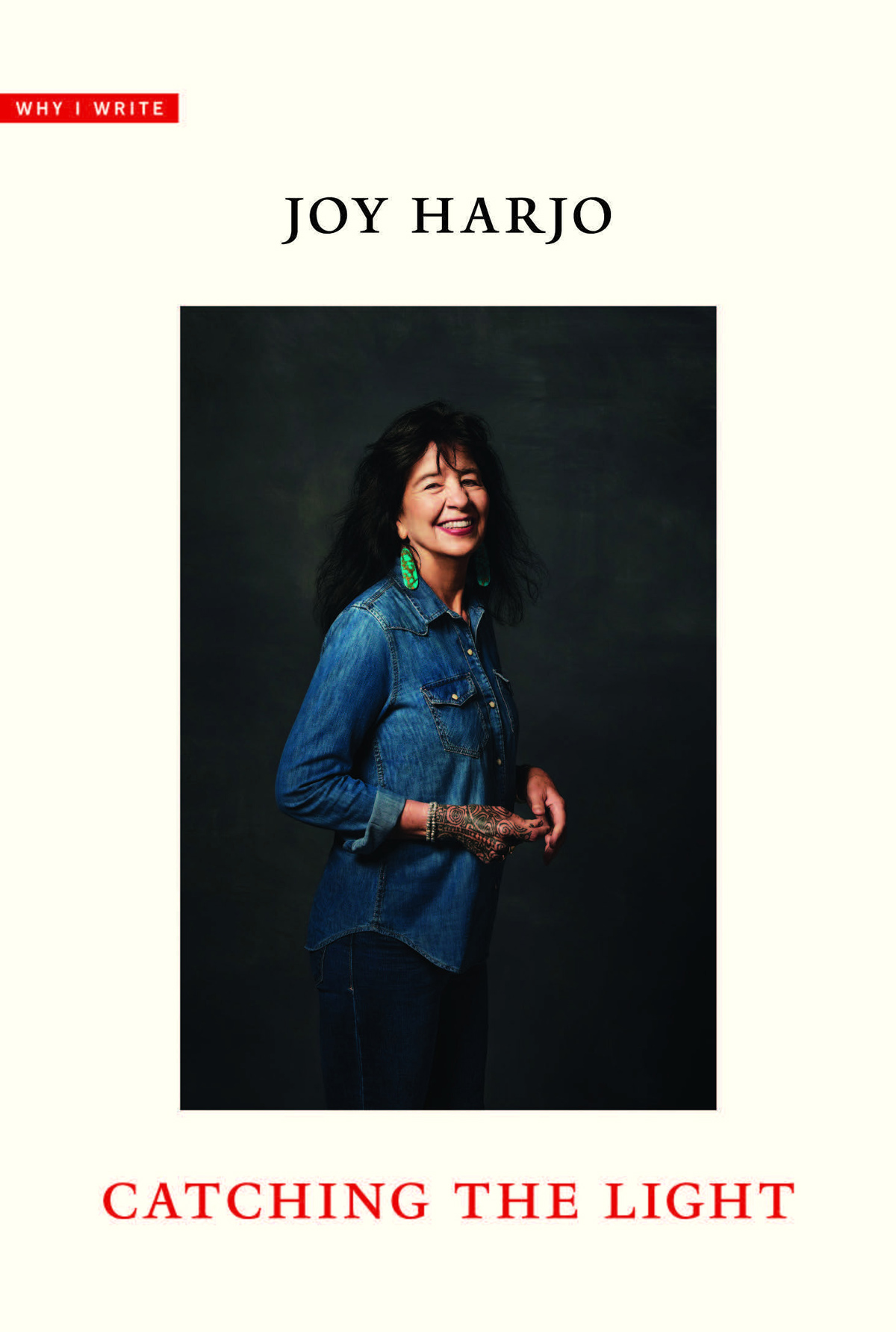Poetic Justice: Joy Harjo’s Artistic Journey in the Story Field
Bioneers | Published: October 15, 2025 ArtIndigeneityNature, Culture and Spirit Podcasts
National Poet Laureate and musician Joy Harjo shares her artistic journey as a Native American woman into what she calls the “story field.” She says that in these times of radical disruption, chaos and disturbance, great creativity also pours forth… and we all play a part in which way the story will go.
Featuring
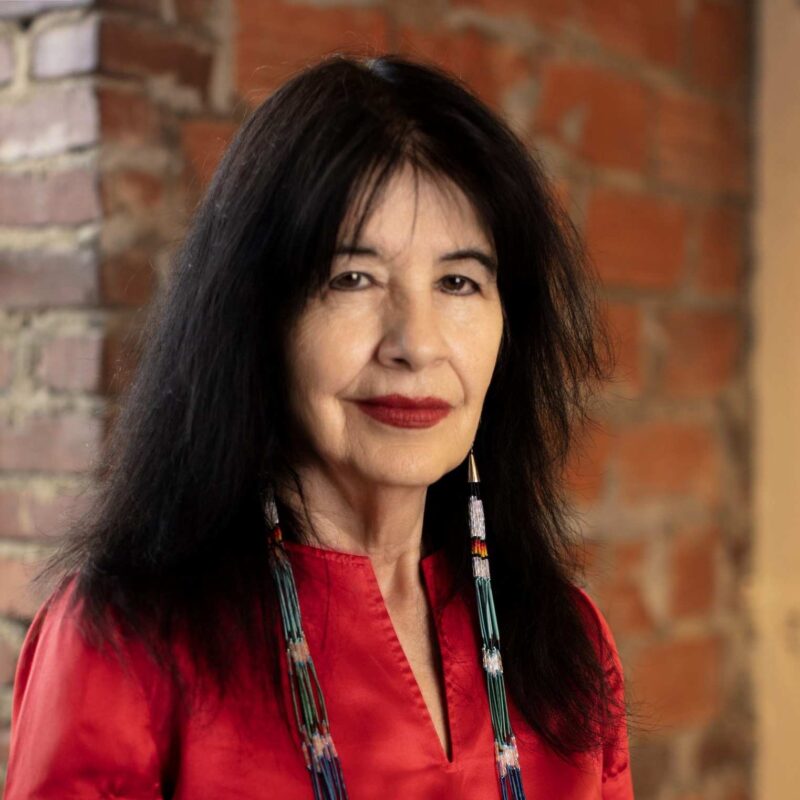
Joy Harjo is an internationally renowned performer and writer of the Muscogee Nation. She served three terms as the 23rd Poet Laureate of the United States from 2019-2022 and is winner of the Poetry Society of America’s 2024 Frost Medal, Yale’s 2023 Bollingen Prize for American Poetry, and was recently honored with a National Humanities Medal.
Credits
- Executive Producer: Kenny Ausubel
- Written by: Kenny Ausubel
- Senior Producer and Station Relations: Stephanie Welch
- Associate Producer: Emily Harris
- Producer: Teo Grossman
- Host and Consulting Producer: Neil Harvey
- Production Assistance: Mika Anami
- This program features music by Joy Harjo and from Nagamo Publishing, the Indigenous-created music library.
This is an episode of the Bioneers: Revolution from the Heart of Nature series. Visit the radio and podcast homepage to find out how to hear the program on your local station and how to subscribe to the podcast.
Subscribe to the Bioneers: Revolution from The Heart of Nature podcast
Transcript
Neil Harvey (Host): Joy Harjo is a Muscogee Creek matriarch. She was born in Tulsa, Oklahoma, in the heart of Muscogee Creek Nation. She comes from a people rich in tradition. They are language speakers, storytellers, singers, artists, preachers, dancers, and fierce protectors of their land, culture and community.

As a young woman pursuing painting, Joy left Oklahoma and attended the Institute of American Indian Arts in Santa Fe, New Mexico. She went on to study painting at the University of New Mexico. She came of age against the 1960’s backdrop of intense political rights movements, including those for Indigenous rights, civil rights, and women’s rights.
Poetry became part of her artistic life amid this larger upheaval.
Joy has written eleven volumes of poetry, two memoirs, and several plays, musicals, non-fiction works, and books for young audiences.
In 2019, she was named the 23rd United States Poet Laureate, making her the first Native American to hold the position. She was appointed to her third term in 2021. Joy Harjo has been an inspiration for countless young Native artists.
She spoke at a Bioneers conference.
Joy Harjo (JH): I just want to say, coming into this place, I want to thank the redwoods out there who are helping me prepare. I want to start with a dream and what I’ve learned. I learn a lot in dreams. And you could say sometimes I challenge myself to think that I’m walking through a dream right now, and maybe we are, and what would I do? What would I do in that if I understood that we are in the dream field, or the story field. They call it the story field. The story field.
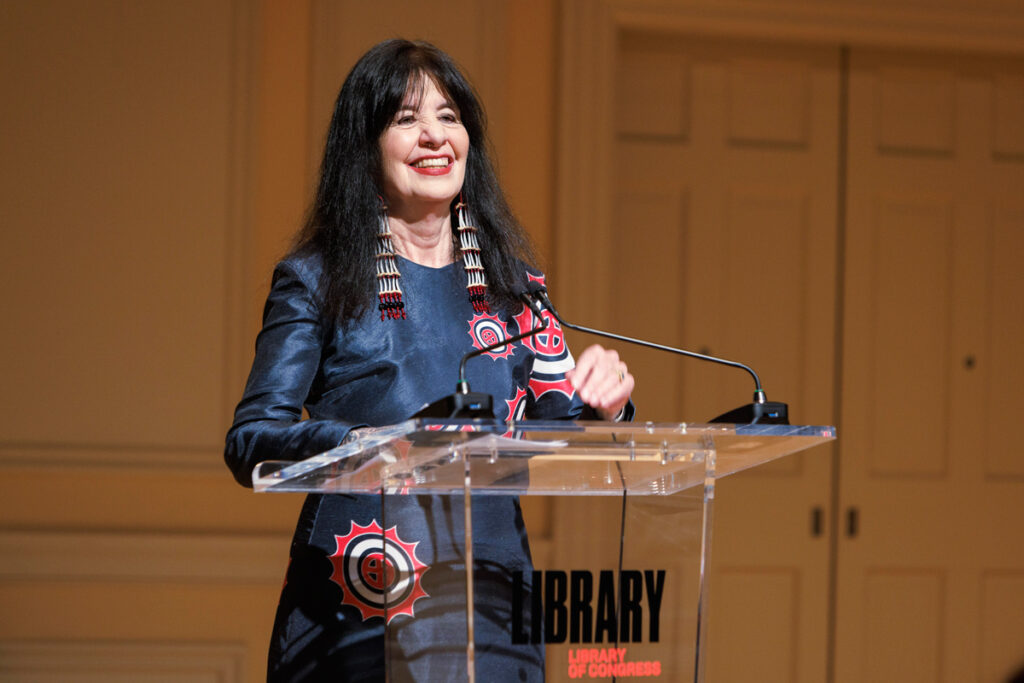
When I was young in my poetry making, I was a mother to two young children with a full-time job, and tending to what my art demanded. I was beset by dreams that were appearing more and more dimensional and real. I was as awake in them as I was in my living. I’ll just read this.
In one of my dreams I was taken by a guardian far above the Earth. Earth was dressed in blue and green. She was lit from within. I was enveloped in a lush darkness that extended forever to eternity. Space was not empty, rather there was a profound depth of sound presence, like an echo stacked within many layers of echoing. There were blues that don’t exist in every day earthly existence, stars and planets gleamed like giant colored diamonds. I was in a circle of exquisite belonging.
When I looked closer to the detail, I saw a lit field of stories. They were all over the world through all time. The stories were continually shifting and shaping color. Where there was kindness, there was light. Meanness made upheaval. There were those who created light and shared it, and others who stole and devoured it. Every story that ever happened made an imprint on the field. The past was just as mobile as the present and future. Everyone’s thoughts, dreams and actions were motivated by the story direction. And when I say everyone, also the animals, the plants, the stones, the winds. Everyone’s thoughts and dreams and actions were motivated by the story direction.
The energetic particles around and through everything were made of what we Muscogee people called [awn-nuh-getch-kuh] or love. It is a fierce love that is strong enough to compel to beauty and right action. It is a love beyond what is fully comprehensible by any singular mind. We need all of our minds to comprehend us.
It is happening now. In the dream I understood that we are “Ekvnvcakv” Earth. In my Muscogee language, “Ekvnvcakv” we are the story. All of this was shown to me.
Then I woke up. I was much like you. I turned off the alarm, slid out of bed, and stepped into the details of the day. But…I believe that’s our natural way of knowing. It’s about, ultimately about listening, and deep listening, and even deeper listening. What about the sounds beyond what two-legged humans can hear? What about those sounds? And what about those songs beyond what we two-legged humans can hear? And what about the stories beyond what we two-legged humans can perceive?
Host: Joy started writing in 1973, when she was a 23-year-old mother of two and deeply engaged in the surging Native rights movement. She recalls this: “I started writing poetry out of a sense of needing to speak not only for me, but all Native American women. It has a lot to do with investigating history and finding a voice when I felt that I had no voice.”
JH: We are in a…crossroads in a time of chaos, and a time—we know about these times, but every—it’s something that we couldn’t really imagine, imagine for here. But it’s always in those times of great disruption, chaos, and disturbance that creativity steps forth.
I keep thinking about a butterfly and the whole chrysalis. I keep thinking that we’re kind of in a chrysalis stage. And you know what happens there. We’re going along, and we’re like, we’re caterpillars, and we’re having a good time, and our life, we kind of know the parameters, and then it shifts. It’s sort of like the— you know. And maybe—Obviously, it didn’t just happen,. wWe’re in the story and there’s a culmination. You know? It’s a culmination of many, many—of lack of attention, lack of care, um lying to ourselves, allowing others to lie to us, not participating, addiction, etc., etc. But here we are.
And I think of us right now as two-legged humans in this, and even Earth herself, because we are her, in a kind of chrysalis stage, which is a stage in which everything you knew turns into a kind of soupy mess. I mean, I don’t know what exactly happens in a chrysalis, [LAUGHTER] all I know is that you go in a caterpillar, and then you come out and you’re able to fly and you have beautiful wings and a body. But who’s to say the caterpillar isn’t as beautiful? And that comes to story and the stories we tell ourselves, and how we tell the stories.
So I want to share a poem. It’s a story. It’s based on– it’s a contemporary, traditional Muscogee story, because we keep going, and we keep telling stories and making stories. But in a way it’s a kind of story about how we came to where we are right now.
Rabbit is up to tricks, and in our culture, rabbit is the trickster figure. And we usually have trickster figures near anywhere there’s power because they show us what happens when power is misused. And those wielding power can often get confused or get taken in, because they forget that any power that any of us has personally or collectively is meant to be shared.
Rabbit is up to tricks. In a world long before this one, there was enough for everyone until somebody got out of line. We heard it was rabbit, fooling around with clay in the wind. Everybody was tired of his tricks, and no one would play with him, and he was lonely in this world. So rabbit thought to make a person. And when he blew into the mouth of that crude figure to see what would happen, the clay man stood up.
Rabbit showed the clay man how to steal a chicken. The clay man obeyed. Then he showed him how to steal corn. The clay man obeyed. Then he showed him how to steal someone else’s wife, and that clay man obeyed. Rabbit felt important and powerful, and clay man felt important and powerful. And once that clay man started, he could not stop. Once he took that chicken, he wanted all the chickens. Once he took that corn, he wanted all the corn. And once he took that wife, well, he wanted all the wives. He was insatiable.
Then he had a taste of gold. He wanted all the gold. Soon it was land or anything else he saw. His wanting only made him want more. Soon it was countries. Then it was trade. The wanting infected the Earth.
We lost track of the purpose and meaning of life. We began to forget our songs, our stories. We can no longer see or hear our ancestors, or talk with each other across the kitchen table. Forests were being mowed down all over the world to make more, and rabbit had no place left to play. Rabbit’s trick had backfired.
Rabbit tried to call that clay man back, but when the clay man wouldn’t listen, rabbit realized he’d made a clay man with no ears.
Host: When Yale University invited Joy to give a speech and then create a book from it, instead she wrote the book first, called “Catching the Light.” The topic was “Why I write.” She reads from one section about Guardians.
JH: I mean I’ve wondered you know, how did I become a poet or what is it? There’s the familial genealogy and then there’s your spiritual genealogy, —your soul’s genealogy, the genealogy of a place, the genealogy, even, of ideas, genealogies of songs and so on.
Every place has guardians whose responsibility it is to tend that person or place. There are guardians of cities, mountains, plants, and animals, for all beings and states of mind on this planet Earth. These guardians are real and, in healthy societies, they are active.
When the guardians or keepers of these lands are forcibly removed, massacred, and their lifeways stolen through the theft and warehousing of children, when female power is no longer standing equal with male power, then the lands suffer, we all suffer. The waters become polluted, fires are out of control, storms become massive and aggressive, and the earth trembles. There is confusion and destruction among all those who inhabit the land, these times.
But we can change the story, and that is done by the artists, the thinkers and the dreamers, those who can envision from within this immense field. Indigenous artists must be part of the leadership in the revision of the American story. We can change the story of a violent hierarchy that follows in the wake of the Papal Bulls, proclaiming Indigenous Peoples as non-humans for land and resource theft and slavery, to manifest destiny, which opened the West and the world for the taking, and set in place a caste system that places value according to skin color, culture, sexual identity, and economic standing.
We can turn to honoring female power without whom there is no life. Rivers, mountains, lands, other animals and elemental inhabitants will be respected co-inhabitants. Time, experience, and the ancestors have taught me that it is while practicing our arts and in ceremony that we come closest to who we really are as individuals, as part of a family, a generation, a country, a planet, a timeless point of experience. It is when we come into close contact with our ancestors, the origin. We must feed that place, honor it.
I bow down to the storykeepers, to the keepers of poetry. I’m reminded of the water spider who, when the Earth was covered with water, carried an ember on her back so we could make fire to keep the story going. Everything is a prayer in the becoming as she approaches us swimming through time.
Host: “Guardians” is a fertile expansion of the human rights story – and it’s more than a story.
When we return, Joy Harjo suggests that what’s up for humanity today is to practice deep listening. The world is teeming with communication – human and other-than-human – visible and invisible. She says it’s a vast living story and we all have a voice in how the story will go.
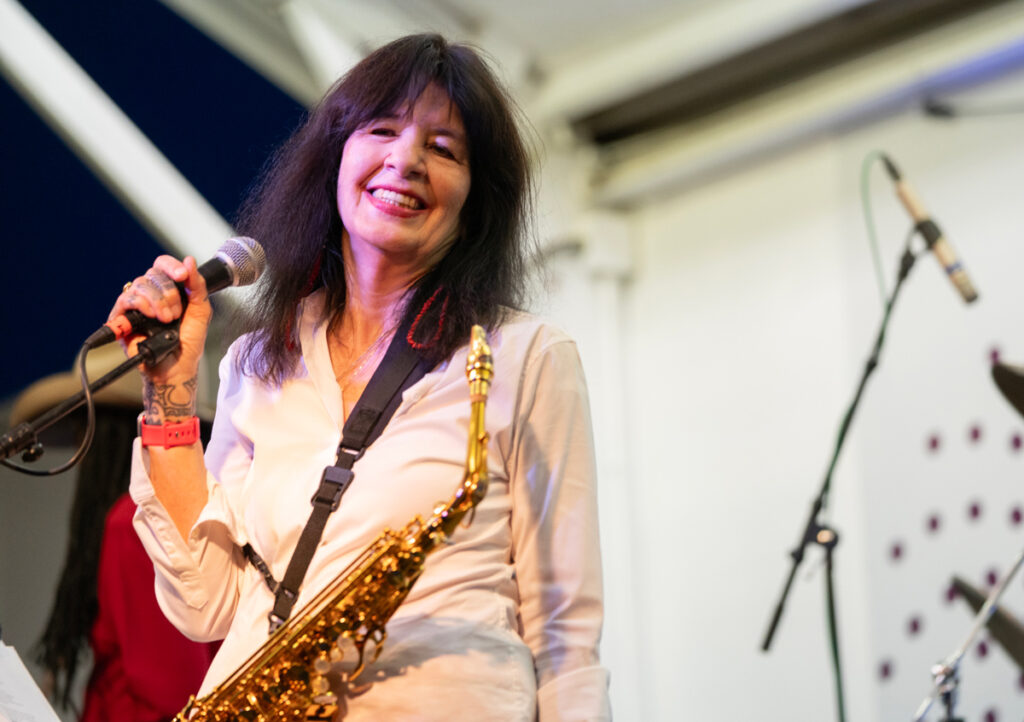
Host: The song you just heard is “Winding through the Milky Way” by Joy Harjo.
You can explore our extensive media collection from our annual Indigenous Forum and learn more about the Bioneers Indigeneity Program at bioneers.org. You’ll find educational materials and news about catalytic initiatives to support the leadership and rights of First Peoples. That’s bioneers.o-r-g.
Along with her writing, Joy Harjo has taught English, creative writing, and American Indian studies at numerous universities. She was a former chancellor of the Academy of American Poets, and served as a founding board member and chair of the Native Arts and Cultures Foundation. She’s the recipient of many prestigious honors.
Joy is also an accomplished musician who performs with her saxophone and flute, both solo and with her band Poetic Justice. She has released six award-winning music albums. Which makes sense, because, unlike the clay man, she’s learned that it’s all about learning to listen. She’s all ears…
JH: I have many teachers and mentors, many of the human ones gone, and plant mentors, the Pacific Ocean, I lived and raced canoes in Oahu for 11 years. [APPLAUSE] And the ocean there is one of my most beloved teachers.
But it’s about listening. I remember one time when I was in Oahu, and I was in my room where I was working, and when you’re in that creative space you think about what you do listen to and the sounds you do hear. In the city, it’s not often the trees. You know? You get a lot of other kinds of sounds. But I was sitting there in that space of deep creativity, because when you go there, you start to hear, you start to really hear. Sometimes I think that there’s seven levels to hearing. And I know this because I feel like there was a trickster god who looked down and looked at me and said she’s beyond hope; she doesn’t know how to listen, so we’ll make her a poet and a musician, and she’ll have to learn. [LAUGHTER] So I know that I was somewhere around. I haven’t hit the seven levels of listening yet.
But I was listening, and deep listening, and I hear a voice say come out, come out here and see me. And so I thought, well. And it was insistent, so—And there was a little bird. I used to feed the birds every morning, and there was a bird that didn’t like to eat that early, and it would come out later, and I would feel it tug on me. So I would always go out when it would tug on me. I would go out and it’d be out there waiting for its food.
So I went out to see who was asking me, and it was a rainbow. And I thought, okay, I know people might think I’m crazy, but that’s okay. And I took a photograph of it. I have a photograph of it that I printed out. And so I thought, okay, and I just put it somewhere, you know, in my poetry file. And about a year later, I’m in Albuquerque with one of my guitar players, Larry Mitchell, and we’re driving south. He and his wife are in the front seat, and I was on the left driving south to go do a photoshoot down in the Rio Grande, in the valley. And we’re going along in the Sandia Mountains—and I love those mountains—were on the left, and I see a rainbow, and I hear: I will see you later, and I’m going to bring someone with me. And I thought, okay. Of course, I didn’t say anything to anybody, and I never talked about this for some time.
But we get down there. We’re out photographing, and a double rainbow appears. [AUDIENCE RESPONDS] But the reason I’m telling you this is, I mean, I don’t know why. I’ve had other—a few other experiences, but it reminds me that we are in a living story, and that there is communication, and it’s—I’m not special. This is something that happens to all of us, but we don’t always listen. It’s going on all the time, this communication—with the redwoods out there—there’s this continual communication.
And so I’m giving you this because I want people to know that we are part of a living system. It is living. And it’s ongoing. And we just—I think we just have to listen.
When I grew up, we had radios. We had local stations. And the big deal was when I got a little transistor radio and I could take it to bed and listen. But we can hear all kinds of sounds now. But I think what this time is requiring of us, because I think what happens when the caterpillar goes into that chrysalis state, it’s in deep listening to imagine what’s possible, to imagine becoming.
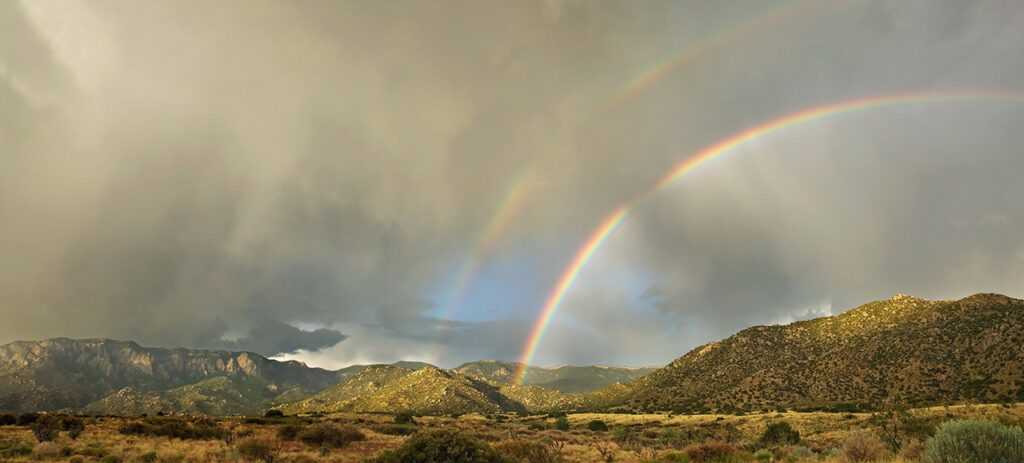
This poem is called Remember, and this poem—and this is about listening. Okay? This was when I was very young. It’s one of the earliest poems that I ever wrote, and it’s been a poem that’s gone all over the world. It’s on Lucy spacecraft right now. And it has its own book. But it tells me that we all come in with story, we all come in with gifts, every one of us. Sometimes we get lost, that’s part of the story. We wouldn’t have stories if no one was lost. We wouldn’t have stories if everybody behaved. Nobody wants to hear about that. So if you think about that…You think about that. Think about the story we’re in right now. What an amazing and terrible and beautiful story we are all in together. And we are all part of what’s going to happen, and we all have a part in which way the story will go. Everyone, everyone has a part in which way the story will go.
So I want to close with the poem Remember because it came to me. I was a young woman. I had no plans to become a poet. It wasn’t offered in career day. I was going to be a painter, an artist. That’s what my grandmother, my great aunt who became my grandmother, was my grandmother too, they were painters, and that’s what I did from when I got up as a little kid. And this poetry thing came at me, and I finally had to give up and say, yes, I’ll do it, although I didn’t understand it, and I still don’t totally understand it, except that it’s how I move through the world, to carry something with me that is beyond what I know and understand.
So this poem—and I’ll share it, I’ll close by sharing it with you—came to me because I realized that I needed this poem. It was teaching me. Well, who was teaching me? Who writes the poetry? What’s behind? What is this thing called inspiration? What is this thing? It’s related to breath—inspire—inspiration, breathing. We’re here breathing. And it’s related to that. And so it came.
We all have helpers and we have guardians, some of them are right here with us. We see them and some we don’t see. We don’t see…Again, what can we see? How far can this Earthly human eye see versus our spiritual eyes that we also all have?
So this is Remember. This poem came and helped me out. And it still helps me out. And I’m offering it to you to be useful and mvto, mvto, mvto, mvto. Thank you for gathering here together. And it’s wonderful to see all the young people and the stories that you are making that will give nourishment to this Earth.
Remember the sky you were born under.
Know each of the stars’ stories.
Remember the moon,
Know who she is.
Remember the sun’s birth at dawn,
That is the strongest point of time.
Remember sundown and the giving away to night.
Remember your birth, how your mother struggled to give you form and breath.
You are evidence of her life, and her mother’s, and hers.
Remember your father, he is your life also.
Remember the earth, whose skin you are—red earth, black earth, yellow earth, white earth, brown earth.
We are earth.
Remember the plants, trees, animal life who all have their tribes, their families, their histories too.
Talk with them.
Listen to them.
They are alive poems.
Remember the wind.
Remember her voice.
She knows the origin of this universe.
Remember you are all people and all people are you.
Remember you are this universe and this universe is you.
Remember that all is in motion, is growing, is you.
Remember.
“Remember.” Copyright © 1983 by Joy Harjo, from SHE HAD SOME HORSES. Used by permission of W.W. Norton & Company, Inc.
Host: Poetic Justice: Joy Harjo’s Artistic Journey in the Story Field

